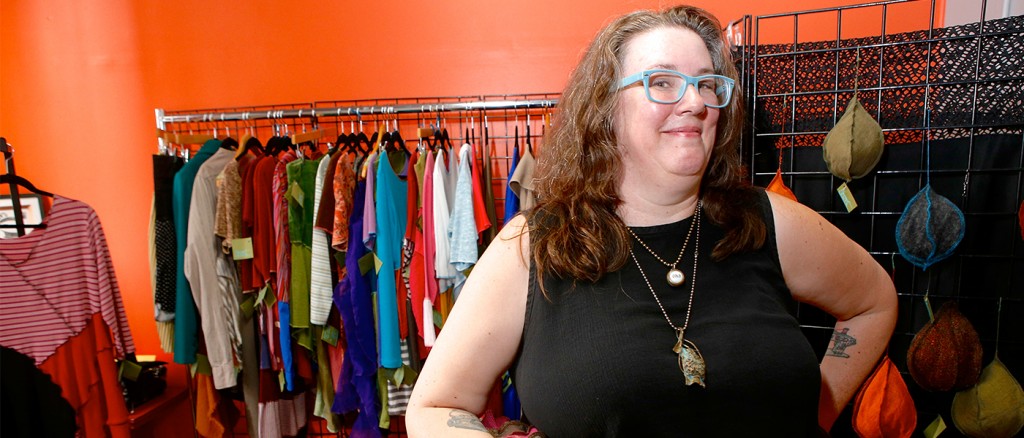When Helen Carter of Syracuse opened an online Etsy store in 2006, she was living the dream of the Etsy’s founder, Rob Kalin.
Kalin’s goal was to build a place for makers of handmade goods (known simply as makers) to earn a living with their work. The result was Etsy, an online, peer-to-peer marketplace connecting makers and buyers. When the company launched in 2005, it was a haven for small-scale artists like Carter.
“We were all sort of in it together,” Carter said. “You could ask the founder a question on the forum and have him answer it.”
Carter, 50, makes alternative up-cycled clothing through her brand, Secret Lentil. She and husband, Michael Burton, have been running the business full time since 2008. They embraced the adventure of self-employment and have managed to make a living as artists in an artistically hostile economy.
In 2013, Etsy CEO Chad Dickerson oversaw one of the company’s most significant developments since launching 10 years ago: Makers were given the OK to hire employees and outsource production to manufacturers. It was a risky move for a start-up built on the backs of handcrafting entrepreneurs.
The policy change was a financial boon for makers with the ability to change their production in both practice and ethos, yet a disaster for everyone else. For Carter, the risk hasn’t paid off. Secret Lentil now has to compete with manufactures with 40,000 sales and counting.
“If they had a search feature that separated me from them, that would be OK,” she said. “But I’m just buried by stuff in there. Just buried.”
Etsy hammered another nail in its handmade coffin in April, when the company filed an initial public offering at $16 per share. Some sellers stayed and partnered with manufacturers to increase their production and earn more income. As a working artist, it’s hard to say no to a business model that allows you to fill up your tank without moonlighting as a barista.
But others, like Carter, had no interest in managing extra workers, hiring manufacturers or compromising their principles.
“I don’t want to be a manager, I don’t want to be an administrator,” she said. “I want to be a maker, and I want to make a living making things. If I can’t do it that way, I don’t want to do it.”
The bulk of Secret Lentil’s business now comes from craft shows and festivals. Locally, they’re not alone. Skaneateles jewelry maker Betsy Menson Sio has an Etsy store, but she does most of her business in person, while Syracuse artist Barbara Conte-Gaugel sells exclusively in person.
Carter and Burton still have an Etsy store, but with fewer than 10 percent of their sales coming through the website, it hardly adds to their business. It’s a placeholder, a memory from the short-lived realization of Rob Kalin’s creative vision.
Carter doesn’t dwell on it, however. As an entrepreneur, she adapted her business model and used the opportunity to build an in-person, word-of-mouth clientele base.
As for her role as a maker, she has no plans to slow down. “I’m always changing what I do within Secret Lentil, just to follow my own curiosity,” she said.
Her latest material of choice: recycled men’s shirts. “They come in a lot of stripes and checks and odd colors,” she said. “I’ve just been making things and then dyeing the whole garment when I’m done, seeing what happens.”
Regardless of Etsy’s business inclinations under Dickerson’s leadership, Helen Carter will continue working as an artist in Syracuse. Her studio and shop (idyllically named the Secret Lentil Superette) are located in the Delavan Center, 509 W. Fayette St., where customers can peruse her collection in person. Visit www.secretlentil.com to see more of her designs.
Lindsey O’Laughlin is a graduate student in the Goldring Arts Journalism program at Syracuse University.


